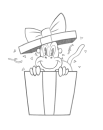Unlocking the Secrets of Creating Depth
In this course, you'll learn how artists turn a flat surface into a deep world. Perspective is more than just drawing boxes and buildings, it applies to everything around us. By understanding perspective, you can draw anything you imagine in any position and style.
Why Learn Perspective?
Do you get ideas for images but find them difficult to draw? Do you struggle to depict subjects from different viewpoints? Learning perspective allows you to move beyond copying what you see. You'll be able to create your own scenes and bring your visions to life.
The Foundations of Perspective
We'll start with classic perspective which is 600 years of Renaissance knowledge. Establishing strong foundations, we'll explore how basic forms like boxes and spheres can represent many objects. By adjusting these forms, you can create anything, from simple feet to complex structures.
The Power of Imagination
When you draw from imagination, you create your own worlds. Artists who understand perspective can illustrate anything from any point of view. You'll learn how to make trees get smaller as they recede, draw people walking down a street, and render objects credibly.
Treasure Hunt Project
Your first project is to collect your favorite drawings by perspective masters. Seek out artworks that showcase perspective, like studies by Leonardo da Vinci, or environments by De Vries. Also, gather potential perspective problems you want to solve, questions and puzzles you care about. Check out the assignments tab for more info!
Examples of Perspective Problems
- How do arches get smaller as they recede? There's a science to it, and it's not difficult.
- Can you alter that science and still look credible? Yes, you can experiment while maintaining believability.
- How do you change the viewpoint of an object? Learn to draw something from a different angle.
- How do figures on a merry-go-round appear in perspective? Discover how they clump at the edges and spread out in the middle.
If you're eager to tackle these challenges, you're in the right place.
Want to learn more about perspective? Join the premium course to get access to all the lessons, demos, projects, and critiques!
For your first project, you’ll have 2 tasks to complete.
- Collect some of your favorite drawings by perspective masters to set a standard for skill development.
- Big picture goal - think about problems you'd like to solve that require skills in perspective. Maybe drawing something from a different angle that you don't have reference for, or creating mathematically sound architecture from imagination.
I will be doing a video critique for this project, so make sure to share your thoughts with the community and you'll have a shot at being in the video!
Submit your assignments by 10/01/2024 for a chance to be in the critique video!









